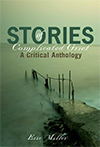Loss. Yearning. Anger. B itterness. Shock. Estrangement from friends and family. What constitutes normal, versus complicated, grief?
itterness. Shock. Estrangement from friends and family. What constitutes normal, versus complicated, grief?
Grief is often a difficult issue for people to deal with, and there is no right or wrong way to grieve, but there are healthy ways to cope with loss. Stories of Complicated Grief: A Critical Anthology is authored by social work and other human service scholars who have personally experienced complicated, protracted, or otherwise difficult grief and who write openly about their experiences but also place their stories in a larger academic context. This is the sense in which the book constitutes a “critical anthology” and fills a void in the academic, clinical, and general literature.
Complicated grief, also known as prolonged grief disorder, is a controversial issue. A commonly used measure of complicated grief, the Inventory of Complicated Grief scale, appears to have six distinct components: yearning and preoccupation with the deceased, anger and bitterness, shock and disbelief, estrangement from others, hallucinations of the deceased, and distinct behavioral changes within the individual. Although there is not an absolute consensus about this point, some scholars and clinicians believe that this form of grief should be recognized as its own unique mental disorder in the Diagnostic and Statistical Manual of Mental Disorders (DSM).
But what constitutes normal grief, and what constitutes complicated grief, are not universal agreed upon parameters. Some expressions of grief are culturally-specific, and no single set of guidelines may capture the variety of ways that normal grief is expressed in various cultural settings. Therefore, how to deal with grief, and whether or not complicated grief should be pathologized, is also subject to debate.
Eric D. Miller, the editor of Stories of Complicated Grief, writes:
Readers of this anthology will quickly discover that virtually all of the chapters detail personal accounts and stories from individuals who poignantly discuss how their experiences of loss and grief—with particular emphasis on the ability to give voice to these narratives through writing—allowed for some degree of personal growth and betterment. In doing so, these accounts definitely should raise questions regarding the wisdom of labeling complicated grief as pathological.
Certainly, Stories of Complicated Grief adds to the much needed literature on the subject of grief, and informs the discussion on how complicated grief should be dealt with by mental health professionals.



